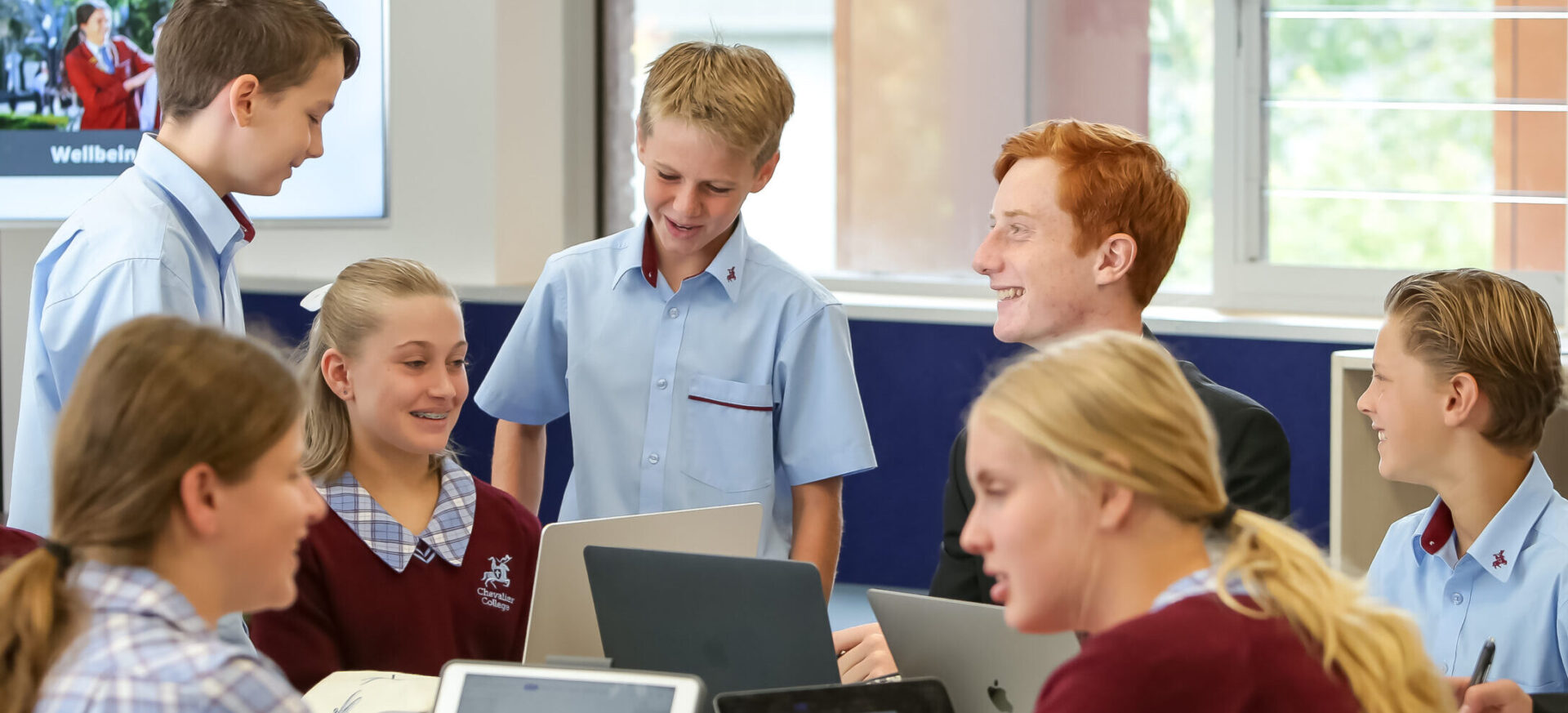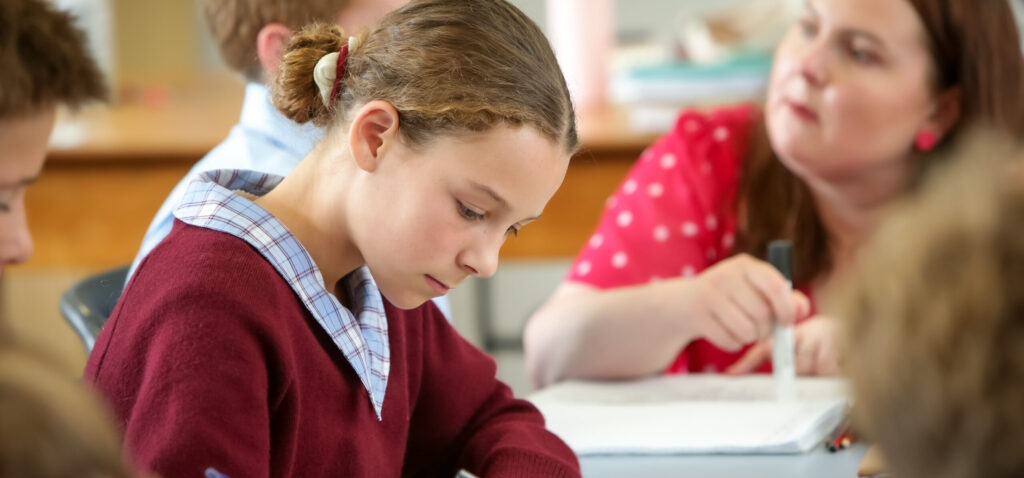Chevalier strongly believes that Best Use of Time (BUoT) will better prepare our young people for their life beyond school and support them to flourish, and answer three critical questions:
Through addressing disruptions and rethinking the traditional timetable, BUoT can deliver:
Let’s start by breaking down some of the terminology.
Chevalier Interest Electives are courses designed by the College using our facilities, teachers and occasional ‘experts in residence’ to allow students to explore areas of interest. Examples running in Year 9 2024 include: Investment and Wealth (combined with Commerce) and Virtual Reality Architecture.
Passion Projects allow students to explore their passions framed within the Stage 6 Design and Technology Syllabus guidelines. Through hands-on experiences and creative exploration, students will embark on individual journeys to discover what inspires them. Utilising the design process, they will turn their passions into tangible projects while learning valuable skills.
HSC Early Commencement refers to the early commencement of the New South Wales Higher School Certificate (HSC) for some subjects in Year 9 and 10, allowing students to tailor their educational experience and gain more flexibility in their Year 11 & 12 timetable.
Below is an outline for each year group in 2024 and the pathways they may take
NESA Core
Chevalier Core
Students complete 1 per semester:
Students in Year 7 get the opportunity to explore more subjects through a broader mandatory curriculum. At Chevalier, students have the opportunity to start exploring their passions and interests through a range of diverse courses. This includes subjects like:
These varied subjects, combined with exploration of their SIM and learning opportunities in our new Virtual Reality Lab, means students are preparing to make choices in Stages 5 and 6 to fully explore their passions and interests.
NESA Core
Chevalier Core
Students complete 1 per semester:
Students in Year 8 get the opportunity to explore more subjects through a broader mandatory curriculum. At Chevalier students have the opportunity to start exploring their passions and interests through a range of diverse courses. This includes subjects like:
In Year 8 the curriculum broadens to include a language other than English, at Chevalier this is currently Japanese.
These varied subjects, combined with exploration of their SIM and learning opportunities in our new Virtual Reality Lab means students are preparing to make choices in stage 5 and 6 to fully explore their passions and interests.
NESA Core
Chevalier Core
Any combination of 2 out of:
NESA Electives
Chevalier Interest Electives
VET Subjects (early commencement of HSC)
NESA Core
Chevalier Core
Any one of:
NESA Electives
Chevalier Interest Electives
VET Subjects (early Commencement of HSC)
Passion Project via Prelim Design and Technology
At Chev, core subjects for Year 11 include:
Studies of Religion (1 unit)
English (2 units)
To complete the preliminary HSC students then build to a total of 12 units based on their choices.
Students at Chev have the opportunity to build the 12 units required for the preliminary HSC by engaging in a wide range of subjects, some of which they may have already started work on in earlier years (early commencement).
Subjects can include:
Agriculture, Ancient History, Biology, Business Studies, Ceramics, Chemistry, Community and Family Studies, Computing Applications, Dance, Design and Technology, Drama, Earth and Environmental Science, Economics, Engineering Studies, English Advanced, English Extension 1, English Extension 2, English Studies, Geography, History Extension, Industrial Technology, Information Processes and Technology, Investigating Science, Japanese Beginners, Japanese Continuers, Legal Studies, Mathematics Advanced, Mathematics Extension 1, Mathematics Extension 2, Mathematics Standard, Modern History, Music 1, Music 2, Music Extension, Personal Development, Health and Physical Education, Photography, Video and Digital Imaging, Physical Education Bushcraft (Wilderness), Physics, Science Extension, Society and Culture, Software Design and Development, Sport, Lifestyle and Recreation, Studies in Catholic Thought, Studies of Religion, Textiles and Design, Visual Arts, Vocational Education and Training (Certificate II in Agriculture, Certificate III in Business, Certificate II in Construction Pathways, Certificate II in Hospitality, Certificate II in Kitchen Operations)
At Chev, core subjects for Year 12 include:
Studies of Religion (1 unit)
English (2 units)
To complete the HSC students then build to a total of 10 units based on their choices.
Students at Chev have the opportunity to build the 10 units required for the HSC by engaging in a wide range of subjects, some of which they may have already started work on in earlier years (early commencement).
Subjects can include:
Agriculture, Ancient History, Biology, Business Studies, Ceramics, Chemistry, Community and Family Studies, Computing Applications, Dance, Design and Technology, Drama, Earth and Environmental Science, Economics, Engineering Studies, English Advanced, English Extension 1, English Extension 2, English Studies, Geography, History Extension, Industrial Technology, Information Processes and Technology, Investigating Science, Japanese Beginners, Japanese Continuers, Legal Studies, Mathematics Advanced, Mathematics Extension 1, Mathematics Extension 2, Mathematics Standard, Modern History, Music 1, Music 2, Music Extension, Personal Development, Health and Physical Education, Photography, Video and Digital Imaging, Physical Education Bushcraft (Wilderness), Physics, Science Extension, Society and Culture, Software Design and Development, Sport, Lifestyle and Recreation, Studies in Catholic Thought, Studies of Religion, Textiles and Design, Visual Arts, Vocational Education and Training (Certificate II in Agriculture, Certificate III in Business, Certificate II in Construction Pathways, Certificate II in Hospitality, Certificate II in Kitchen Operations)
The introduction of Future Facing in 2024 is an opportunity for the College to start implementing concepts and approaches that are proven to better use time and support our students to flourish in a rapidly changing world
The introduction of Future Facing in 2024 is an opportunity for the College to start implementing concepts and approaches which better use time and support our students to flourish in a rapidly changing world. Where we start in 2024 is not where we will finish. Through trialing and assessing this approach we will tailor it over the coming years to ensure we are building towards:
Face to Face Learning (F2FL) with a teacher in a classroom is the single biggest determining factor which contributes to student learning growth. It is fundamental to educational achievement.
Flipped learning is when students engage with ‘pre-class’, ‘surface level’ content in advance, and arrive to class ready for deeper learning activities F2F with their teacher. Flipped learning is one strategy which encourages self-regulated learning.
Flipped learning will focus on two keys aspects of learning. Firstly, it will allow time for students to slow down and consolidate recent concepts of learning. Secondly, it will be designated time for students to prepare for the week ahead by engaging in ‘surface level’ tasks, so that there is more time for deeper learning with a teacher when they engage in F2FL each Tuesday to Friday. This approach will be enhanced by a learning cycle that allows for better preparedness for lessons, with fewer interruptions and disruptions throughout the week.
Frequently Asked QuestionsFor Tuesday to Friday, student timetables will look the same as they currently do. Learning will look different on some Mondays as outlined below.


Early Commencement allows a student to ‘spread’ the requirements of the HSC over a three or even four year period. Chevalier has looked at what’s possible and what’s manageable for students and teachers, and has developed a balanced combination of early commencement available to all students from as early as Year 9. The benefit of this is reducing workload and stresses in Year 12 as well as freeing up time for deeper learning.
You can explore the options available from 2024 by selecting the boxes to the left of the graphic below. As you change combinations, you will see how time can be freed up via early commencement.

We know that once students leave school, they need competencies and capabilities that cannot be learnt by just studying for a test. This new model, while enhancing academic performance, will also allow students to build complex capabilities and their sense of self; skills they need as they enter life beyond school.
Where we begin is not where we will finish. Through a process of imagining, designing, planning, implementing and reviewing Chev Future Facing will evolve over the coming years. Our timelines will change as we learn and review.
Next page